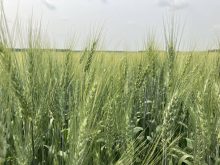China’s release of the two Michaels is an encouraging development for the canola industry.
“The news on Friday was really excellent,” said Jim Everson, president of the Canola Council of Canada.
“It is so good to have that issue resolved and the Michaels home.”
Everson is referring to China’s release of Michael Kovrig and Michael Spavor, two Canadian citizens who spent more than 1,000 days in detention in China.
They were released shortly after Huawei Technologies executive Meng Wanzhou struck a deal with the United States Justice Department and was subsequently discharged from a court in British Columbia.
Read Also

Farming Smarter receives financial boost from Alberta government for potato research
Farming Smarter near Lethbridge got a boost to its research equipment, thanks to the Alberta government’s increase in funding for research associations.
“De-escalating these tensions and creating a better environment for engagement with China is a positive thing,” said Everson.
China suspended the canola export licences of Viterra and Richardson International in March 2019.
Canadian canola exports to that market plunged to 1.54 million tonnes that year, down from the previous five-year average of 4.2 million tonnes.
Sales rebounded a bit in 2020 to 2.58 million tonnes but were still well below normal levels.
Everson said the council seeks a return to a predictable, rules-based trade environment where all Canadian companies are treated equally.
He said the easing of political tensions between China and Canada makes it “more possible” that a resolution could happen within this calendar year, although there is nothing imminent.
“Diplomats have been able to find a solution to a really sticky issue there, so we would hope that they would continue to turn their attention to canola,” he said.
Chuck Penner, analyst with LeftField Commodity Research, doesn’t think canola export volumes and prices would jump much if China suddenly reinstated the export licences for Viterra and Richardson.
“I don’t know if it’s going to increase their purchases, especially since there is nothing to purchase,” he said.
Canadian farmers harvested 12.8 million tonnes of canola, down from 19.5 million tonnes last year. Agriculture Canada is forecasting 6.5 million tonnes of exports, down from 10.5 million tonnes.
“In our (supply and demand chart) we’ve already scaled back exports to basically every destination possible,” said Penner.
“China was able to get what it needed anyway. Other exporters have stepped up,” said Penner.
China has also been importing more canola oil from Canada and other exporters instead of seed.
It appears as though the country has somewhat curtailed its use of the commodity, so it is getting all that it needs from the currently licensed Canadian exporters, he said.


















